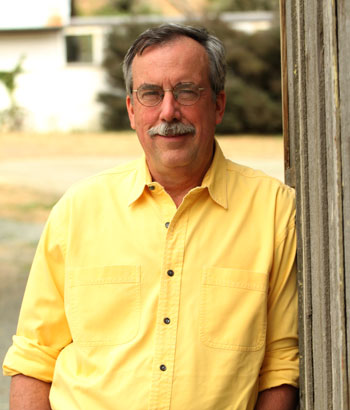Courtney White
I’ve been creating ‘right-brain’ answers to ‘left-brain’ questions since I was thirteen years old when a long summer road trip through Mexico lit a fire that has never gone out. For over forty years, I have expressed my answers in writing, photography, speaking and activism.
Born in Philadelphia, I migrated west to Phoenix at the age of six in a ‘covered station wagon’ with my family. Inspired by the prehistoric ruins of Mexico, I became active in archaeology as a teenager, including two memorable summers of desert survey as an employee of Arizona State University. Pursuing ‘left brain’ questions raised by my interests, I earned a B.A. in Anthropology from Reed College. I chose to express my answers creatively in books and photography as well as films made while attending UCLA’s graduate school in filmmaking.
In my twenties, I developed a deep love of the American West through travel, camping, and conservation work for environmental organizations. While employed at UCLA’s main library, I ‘hit the books’ in pursuit of a deeper understanding of the region, studying its history, people, and cultures. In 1990, on the centennial of the official closing of the frontier, I put my research to work when I embarked on a fine art photographic project documenting the modern West. Titled The Indelible West, the book earned a Foreword by author Wallace Stegner.
In 1994, my ‘left brain’ turned full-time to conservation when I became active with the Sierra Club in response to troubling political developments in Washington, D.C. Three years later, I cofounded The Quivira Coalition, a grassroots nonprofit organization dedicated to building a radical center among ranchers, environmentalists, scientists and others around practices that improve economic and ecological resilience. I served as Executive Director for fifteen years before becoming Creative Director. I worked on the front lines of collaborative conservation and regenerative agriculture, exploring on-the-ground solutions to pressing global issues, including land restoration, local food, and the sequestration of carbon in soils.
Quivira was also a creative endeavor for me, involving writing, speaking, shaping an annual conference, and developing new projects. Over time, writing became an increasingly important ‘right brain’ activity. In 2005, Wendell Berry included my essay The Working Wilderness in his collection The Way of Ignorance, a big endorsement that encouraged me to expand into book writing, including Revolution on the Range (Island Press); The Age of Consequences (Counterpoint); Two Percent Solutions for the Planet, and Grass, Soil, Hope (Chelsea Green), the latter with a Foreword by Michael Pollan. In 2017, I published a collection of my writing on the effort to resolve the feud between environmentalists and ranchers that had imperiled the wide open spaces of our beloved West, titled Grassroots: the Rise of the Radical Center.
In 2016, I embarked on a new ‘right brain’ project to write fiction, inspired by a distant cousin, William Faulkner. My first work, Consilience, is a contemporary love story about time-travel, an uncertain future, and resistance. The Sun is the first book in a mystery series set on an historic ranch in northern New Mexico during the tumultuous year of 2008. It involves a murdered ranch employee, a stolen rodeo horse, a black helicopter, angry environmentalists, menacing oil-and-gas developers, a missing Sasquatch hunter, a mysterious billionaire and a misplaced can opener.
I live in Santa Fe, New Mexico
PRAISE FROM:
Michael Pollan:
“Hope in a book about the environmental challenges we face in the 21st century is an audacious thing to promise, so I’m pleased to report that Courtney White delivers on it.”
Wendell Berry:
“I have asked Courtney White to lend his essay ‘The Working Wilderness’ to this collection for three reasons: First, I think it is a good essay. Second, it tells of a serious and continuing effort on the part of some ranchers and conservationists to develop local knowledge sufficient to support a locally adapted land economy. This is an effort that is needed simply because it is necessary…. Third, it is an essay about cooperation between people and nature, between people and their places, and between ranchers and conservationists. This, again, is necessary…”
“Courtney White’s experience with the Quivira Coalition has made him master of two indispensable truths: People of different and apparently opposing interests can work together in good will for their mutual good; and, granted their good will and good work, a similar reciprocity can be made, in use, between humans and their land.
Other praise:
“In a time when environmental reporting has become justifiably gloomy, this book is a refreshing breath of pragmatic optimism. White’s vision of stewardship, openness to new ideas, giving as well as taking, and flexibility will inspire anyone who loves humanity or the great outdoors.”
– Publishers Weekly
“White strikes a refreshing tone that will resonate with readers turned off by the superior or
condescending attitudes of some environmentalist writers… Throughout, he balances abstract
questions and ideas with tangible life experiences… [R]eaders will be engaged by his frank and thoughtful discussion of our modern environment.”
– Kirkus
“…[A] series of deeply personal essays that cogently examine pertinent issues from both grassroots and global perspectives. With a tone that is predominantly upbeat yet tempered by the intensely personal concerns of a parent, White offers specific examples of beneficial strategies that can mitigate present conditions and secure future successes.”
– Booklist
“I couldn’t put Revolution on the Range down – so many good ideas from people who have discovered workable means to effect positive change in our local environments and ways of thinking about our place in the world. This is one of the most encouraging and inspirational books I’ve read in ages.”
– Deborah Madison, author of Local Flavors.
“Courtney White has lived and worked at the radical center of collaborative conservation in the West for more than two decades, literally reshaping dialogue and land stewardship in the region through his innovations. But with this book Courtney demonstrates that his own essays on these concerns can rightfully take its place alongside Scott Russell Sanders and Wendell Berry for its eloquence, depth and lasting impact on the conservation movement.”
– Gary Nabhan, author of Food, Genes and Culture: Eating Right for Your Origins
“Courtney White employs a masterful blend of storytelling and science to communicate a most hopeful message: that building healthy soils – in some surprising and creative ways—can help solve our food, water, and climate challenges all at the same time. The carbon-capturing farmers, ranchers, and conservationists whose work White so elegantly describes form the vanguard of a new movement of regenerative production that deserves society’s attention and support. Inspiring, thought-provoking, energizing, and—at bottom—full of hope.”
– Sandra Postel, Freshwater Fellow, National Geographic Society
“Courtney White chronicles a new and critically important sphere of knowledge: a world of soil, sun, sky, and animals where good people regenerate the earth in ancient and novel ways. Reading about the environment rarely brings one as many smiles and as much joy as Two Percent Solutions for the Planet.”
– Paul Hawken, author of Blessed Unrest; coauthor of Natural Capitalism





